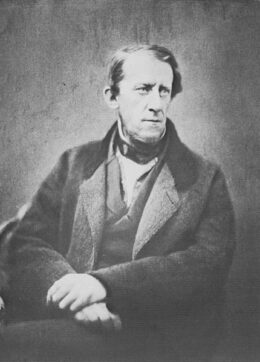
Printed
23 pages
Author(s)
Schimpanse, der Darwinaffe
Intermezzo in einem Aufzug
In the last decades of 19th century, Darwinism as a school of thought went largely beyond the original theory of evolution developed by Charles Darwin (1809-1882) in On the Origin of Species in 1869. Instead, “Darwinism” was often used to refer to “social Darwinism” – a concept defined by philosopher and sociologist Herbert Spencer (1820-1903). Pocci’s Schimpanse, der Darwinaffe is as invested in satirizing Darwin’s theories – which the author had little understanding of – as it is in attacking its sectarians, who wanted to draw a straight line from monkeys to humans beings. Pocci’s play first ended differently – with the releasing of Kasperl and a play on the word “monkey” (which can mean hangover in German) by the mayor. Pocci changed it for the less witty but – according to him – more effective version presented here. Yet, the 1875 edition and most of the following editions kept the first version.
A foul-mouth hero sows discord in town
Casperl is evicted by his landlord and starts looking for a job. He is employed by professor and explorer Gerstenzucker, as…a monkey! Indeed, the professor’s monkey, Schimpanse, has just died. He was trying to teach him human culture to prove that man and monkey are related. But Casperl is ill-behaved. He poses as Gerstenzucker and treats one of his female visitors with extreme uncouthness. Then he fights the professor, wreaks havoc on the inn and sows discord in town. Everyone ends up at the police station, where the fake monkey is exposed. As other characters try to throw him behind bars, Casperl knocks everyone unconscious and, at the end of the play, goes drinking to celebrate the final victory of Darwinism.
First performance
Münchner Marionettentheater
Publications and translations
Franz Pocci: Lustiges Komödienbüchlein, fünftes Bändchen. München, Ernst Stahl: 1875
Franz von Pocci: Lustiges Komödienbüchlein 5. Editio Monacensia, München, Allitera Verlag, 2010
